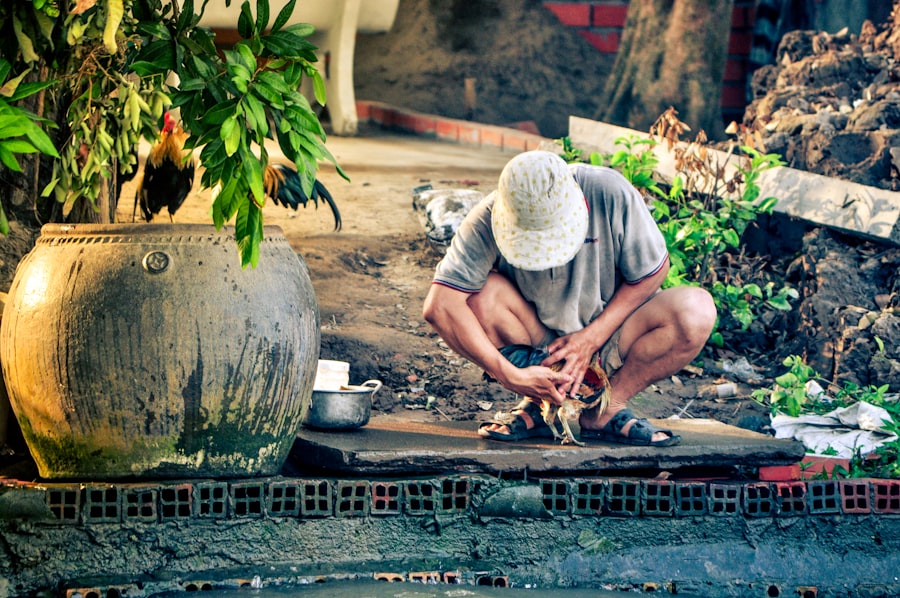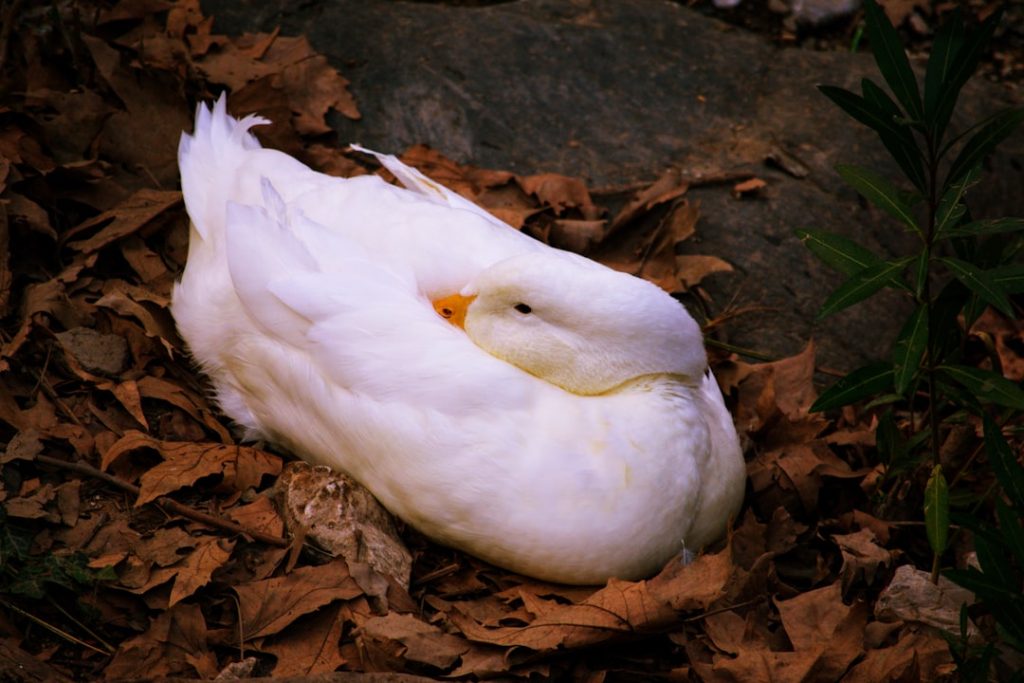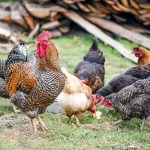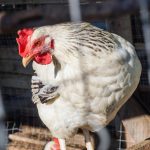Chickens are social creatures that thrive in structured environments. They establish a hierarchical pecking order within their flock, which is essential for maintaining social stability. Understanding this behavior is crucial for providing an appropriate living space.
Chickens are naturally inquisitive and enjoy exploring their surroundings. Common behaviors include scratching the ground, pecking at various objects, and taking dust baths. Recognizing these instinctive activities helps in creating an environment that satisfies their natural inclinations and promotes their overall well-being.
Chickens communicate through various vocalizations and body language. They use clucking, squawking, and other sounds to convey different messages. Additionally, their posture and movements can indicate their emotional state or intentions.
Observing and interpreting these communication methods is vital for understanding their needs and ensuring their welfare. By closely monitoring chicken behavior, caretakers can identify signs of stress or discomfort, allowing for timely adjustments to the living environment. Ultimately, a comprehensive understanding of chicken behavior is fundamental to providing an environment that meets both their physical and psychological requirements.
Table of Contents
- 1 Proper placement of water sources
- 2 Using specialized waterers
- 3 Implementing a regular cleaning schedule
- 4 Creating a designated pooping area
- 5 Providing distractions and enrichment
- 6 Monitoring and adjusting the setup as needed
- 7 FAQs
- 7.1 What are some effective ways to keep chickens from pooping in their water?
- 7.2 Why is it important to keep chickens from pooping in their water?
- 7.3 How often should the waterer be cleaned to prevent chickens from pooping in their water?
- 7.4 What are some other tips for keeping chickens’ water clean?
Key Takeaways
- Chickens are social animals and have a natural pecking order within their flock
- Water sources should be placed at a height that is easily accessible to chickens, but not easily soiled
- Specialized waterers such as nipple drinkers or water fountains can help prevent contamination and spillage
- Regular cleaning of waterers and surrounding areas is essential to prevent the spread of disease
- Designating a specific area for chickens to poop can help maintain a cleaner coop and reduce odor
- Providing distractions such as hanging treats or toys can help prevent boredom and pecking behavior
- Regular monitoring and adjustments to the setup can help ensure the health and well-being of the chickens
Proper placement of water sources
Accessibility and Cleanliness
Chickens need access to clean and fresh water at all times, especially during hot weather or when they are laying eggs. Water sources should be strategically placed in areas where chickens can easily access them without having to travel long distances.
Preventing Contamination
Water sources should be kept away from areas where chickens tend to defecate, as this can lead to contamination and potential health issues. The type of waterer being used is also crucial. For example, if using a traditional open water container, it should be placed on a raised platform to prevent contamination from dirt and debris.
Alternative Watering Systems
Alternatively, nipple waterers or automatic waterers can be installed to provide a constant supply of clean water without the risk of contamination. These systems can help maintain a clean and healthy living environment for chickens.
Benefits of Proper Placement
Proper placement of water sources not only ensures that chickens have access to water when they need it, but also helps in maintaining a clean and healthy living environment for them.
Using specialized waterers

In addition to proper placement, using specialized waterers can greatly benefit chickens and their living environment. Nipple waterers, for example, are designed to provide a constant supply of clean water while minimizing the risk of contamination. These waterers are also effective in preventing spillage and waste, which can occur with traditional open water containers.
Automatic waterers are another option that can provide a continuous supply of fresh water without the need for constant refilling. Specialized waterers also help in preventing the growth of algae and bacteria, which can occur in open water containers. This not only ensures that chickens have access to clean water at all times, but also reduces the risk of potential health issues.
Additionally, using specialized waterers can save time and effort in maintaining water sources, as they require less frequent cleaning and refilling compared to traditional containers. Overall, using specialized waterers is a practical and effective way to ensure that chickens have access to clean and fresh water while maintaining a healthy living environment.
Implementing a regular cleaning schedule
Maintaining a clean living environment is crucial for the health and well-being of chickens. Implementing a regular cleaning schedule for their coop and surrounding areas is essential in preventing the buildup of waste, bacteria, and parasites. This includes removing soiled bedding, cleaning droppings from roosting bars, and regularly disinfecting waterers and feeders.
By keeping their living space clean, you can reduce the risk of disease and ensure that chickens are living in a healthy environment. Regular cleaning also helps in preventing unpleasant odors and attracting pests such as flies and rodents. By removing waste and keeping the area clean, you can create a more comfortable and hygienic living space for chickens.
Additionally, regular cleaning allows you to monitor the condition of their living environment and identify any potential issues that may need attention. Overall, implementing a regular cleaning schedule is essential in maintaining a clean and healthy living environment for chickens.
Creating a designated pooping area
Creating a designated pooping area for chickens can help in maintaining a cleaner living environment and making it easier to manage waste. This can be achieved by placing a layer of absorbent material such as straw or wood shavings in a specific area of the coop or run where chickens are encouraged to relieve themselves. By training chickens to use a designated pooping area, you can minimize the spread of waste throughout their living space and make it easier to clean up.
Designating a specific area for pooping also helps in managing waste more effectively. It allows for easier removal of soiled bedding and waste, reducing the risk of contamination and unpleasant odors. Additionally, creating a designated pooping area can help in preventing the buildup of waste in areas where chickens eat, drink, or roost, promoting a cleaner and healthier living environment for them.
Overall, creating a designated pooping area is a practical way to manage waste and maintain a cleaner living space for chickens.
Providing distractions and enrichment

Mental Stimulation and Enrichment
This can include hanging vegetables or treats from strings or providing objects such as mirrors or perches for chickens to interact with.
Promoting Positive Behaviors
By providing distractions and enrichment, you can promote mental well-being and reduce the risk of negative behaviors such as feather pecking or aggression. Enrichment activities can also encourage natural behaviors such as scratching, pecking, and exploring their surroundings. This not only provides mental stimulation but also helps in keeping chickens physically active and healthy.
A Happier and Healthier Flock
Additionally, providing distractions and enrichment can help in reducing stress and anxiety, leading to happier and more content chickens. Overall, providing distractions and enrichment is an important aspect of creating a suitable living environment that meets the behavioral needs of chickens.
Monitoring and adjusting the setup as needed
Finally, it’s important to regularly monitor the setup of the chicken coop and run to ensure that it meets the needs of the chickens. This includes observing their behavior, checking for signs of stress or discomfort, and making necessary adjustments to their living environment. For example, if chickens are showing signs of aggression or feather pecking, it may be necessary to provide additional distractions or enrichment activities to keep them occupied.
Monitoring the setup also involves checking the condition of water sources, feeders, bedding, and overall cleanliness of the living space. Making regular adjustments such as adding more bedding, cleaning waterers more frequently, or rearranging enrichment items can help in maintaining a suitable living environment for chickens. By monitoring and adjusting the setup as needed, you can ensure that chickens are living in a comfortable and healthy environment that meets their physical and psychological needs.
In conclusion, understanding the behavior of chickens is crucial in providing them with a suitable living environment that meets their needs. Proper placement of water sources is essential for ensuring that chickens have access to clean and fresh water at all times. Using specialized waterers can further enhance their access to clean water while minimizing the risk of contamination.
Implementing a regular cleaning schedule is important for maintaining a clean and healthy living environment for chickens. Creating a designated pooping area can help in managing waste more effectively and maintaining a cleaner living space for chickens. Providing distractions and enrichment is essential for promoting mental well-being and reducing stress-related behaviors in chickens.
Finally, monitoring and adjusting the setup as needed is important for ensuring that chickens are living in a comfortable and healthy environment. By taking these factors into consideration, you can create an environment that meets the physical and psychological needs of your chickens while promoting their overall well-being.
If you’re looking for tips on how to keep chickens from pooping in their water, you might also be interested in learning about the Producers Pride Sentinel Chicken Coop. This coop is designed to provide a clean and comfortable environment for your chickens, which can help prevent them from making a mess in their water. Check out this article to learn more about how this coop can benefit both you and your chickens.
FAQs
What are some effective ways to keep chickens from pooping in their water?
Some effective ways to keep chickens from pooping in their water include using a raised waterer, placing the waterer in a shaded area, and regularly cleaning the waterer to prevent buildup of waste.
Why is it important to keep chickens from pooping in their water?
It is important to keep chickens from pooping in their water because it can lead to contamination of the water, which can cause health issues for the chickens and increase the risk of spreading diseases.
How often should the waterer be cleaned to prevent chickens from pooping in their water?
The waterer should be cleaned regularly, ideally every 1-2 days, to prevent chickens from pooping in their water and to maintain a clean and healthy water source for the chickens.
What are some other tips for keeping chickens’ water clean?
Other tips for keeping chickens’ water clean include using a waterer with a cover or lid, providing multiple water sources to reduce overcrowding, and using additives like apple cider vinegar to discourage chickens from drinking dirty water.
Meet Walter, the feathered-friend fanatic of Florida! Nestled in the sunshine state, Walter struts through life with his feathered companions, clucking his way to happiness. With a coop that’s fancier than a five-star hotel, he’s the Don Juan of the chicken world. When he’s not teaching his hens to do the cha-cha, you’ll find him in a heated debate with his prized rooster, Sir Clucks-a-Lot. Walter’s poultry passion is no yolk; he’s the sunny-side-up guy you never knew you needed in your flock of friends!







